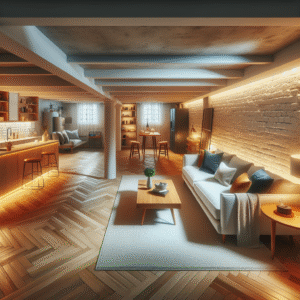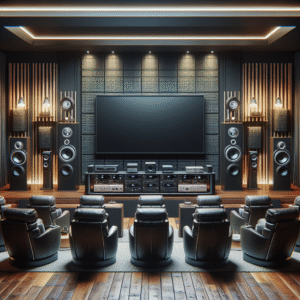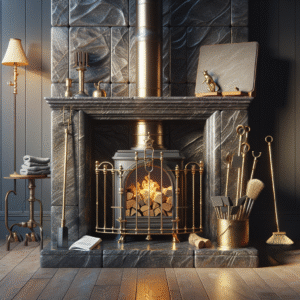Are you considering designing a home office that not only boosts your productivity but also keeps everything organized with style? Built-in shelving might just be the solution you’re looking for. In this comprehensive guide, we’ll walk you through essential considerations for designing a home office with built-in shelving, provide a step-by-step installation guide, and explore the top five storage solutions to maximize your space. Whether you’re a self-employed entrepreneur or a telecommuting employee, these insights will help you create a functional and inviting workspace.
Essential Considerations for Designing Your Home Office with Built-In Shelving
Before you jump into sawing and painting, it’s crucial to plan your home office space wisely. Built-in shelving can offer ample storage and a seamless look, but it needs to harmonize with your work habits and the room’s overall layout. From assessing your storage needs to choosing the right materials, we’ll cover all the bases to ensure your office not only looks great but works efficiently too.
Step-by-Step Guide to Installing Built-In Shelving and Storage in Your Home Office
Ready to roll up your sleeves and transform your home office? Our DIY-friendly guide will take you through each step of the installation process. From measuring and cutting to the final touches of painting and styling, we’ll help you achieve professional results with a personal touch. Plus, we’ll share some trade secrets on how to overcome common challenges during the installation process.
Top 5 Storage Solutions for Maximizing Space in Your Home Office
Effective storage solutions are key to a tidy and efficient office space. We’ll reveal our top five picks for office storage that can help you utilize every inch of your office smartly. From floating shelves to multifunctional cabinets, these solutions are not only practical but can also add to the aesthetic appeal of your office.
By the end of this article, you’ll be equipped with the knowledge to create a beautifully organized workspace that inspires productivity and creativity. Let’s make your home office a place where you love to work!
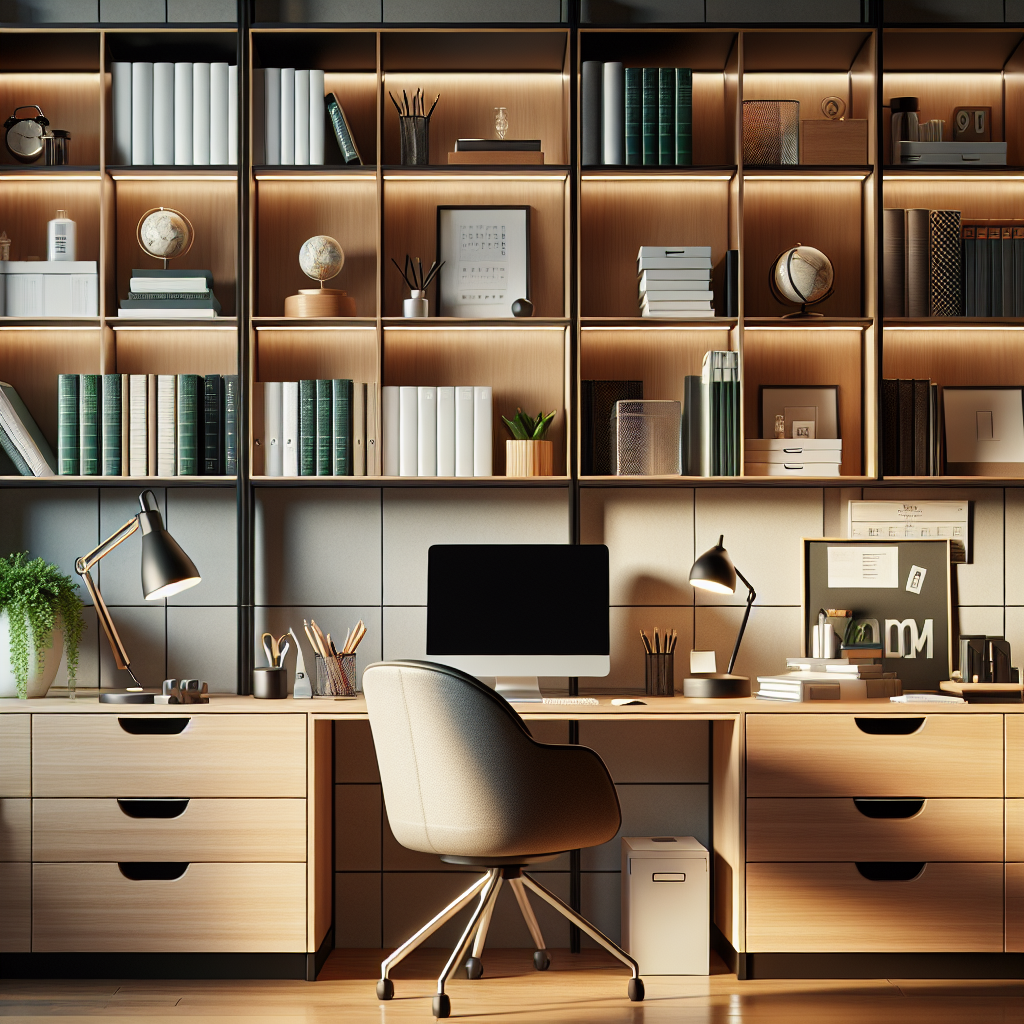
If you’re ready to take your home improvement or construction project to the next level, we can help! Find trusted contractors on BuildNet, whether you’re looking for renovations, new builds, electrical work, plumbing, or anything in between. Our directory connects you with qualified professionals who can make your vision a reality.
Essential Considerations for Designing Your Home Office with Built-In Shelving
As more people embrace the flexibility of working from home, creating a functional and inviting workspace has never been more important. One key aspect of a well-designed home office is efficient storage, and built-in shelving can be a game changer. Not only does it help keep your space organized, but it can also add a touch of style and personality. Here are some essential considerations to keep in mind when planning built-in shelving for your home office.
Assess Your Space
Before diving into the design, take a good look at your available space. Measure the dimensions of your home office, noting the location of doors, windows, and electrical outlets. Consider how much wall space is available for shelving and whether you’ll be displacing anything that’s currently in use. This initial step will help you avoid common pitfalls like over-cluttering your workspace or blocking natural light sources.
Determine Your Needs
Think about what you need to store in your home office. Are you drowning in paperwork or in need of a place for your extensive book collection? Maybe you require space for tech gadgets and their chargers, or you want a showcase for awards and personal items. List your storage priorities and consider how built-in shelving can meet these needs. Each item’s size and frequency of use should influence the shelving design, ensuring that everything is conveniently accessible.
Tip:
Use adjustable shelves for added flexibility. This allows you to reconfigure the shelf heights as your storage needs change over time.
Choose the Right Materials
The materials you choose for your built-in shelving affect both the aesthetics and longevity of your home office. Wood is a popular choice for its durability and classic look, but there are various types and finishes to consider. MDF (Medium Density Fiberboard) is cost-effective and smooth, making it ideal for painting. On the other hand, natural woods like oak, maple, or walnut provide warmth and texture. If you’re looking for a modern touch, materials like metal or glass can add a sleek, contemporary feel.
Consider the Style and Design
Your built-in shelving should complement the overall style of your home. For a traditional home office, consider classic cabinetry with crown molding and detailed trim work. If your home leans more contemporary, you might opt for minimalist shelving with clean lines and a monochromatic color scheme. Think about incorporating elements that match or enhance your existing décor to create a cohesive look.
Idea:
Integrate a built-in desk with shelving units on either side for a seamless and functional design. This can be a great space-saver and adds to the custom feel of your home office.
Plan for Efficiency and Accessibility
Practical considerations are vital. Your shelving should not only look good but also enhance your productivity. Place items that you use daily within easy reach. Install lighting, such as LED strips or under-shelf spots, to ensure the shelves are well-lit, making it easy to find what you need quickly.
Legal and Safety Considerations
If you’re considering a major installation, check local building codes and regulations to ensure compliance, especially if structural changes are involved. It’s also wise to consult with a professional to avoid any potential risks, particularly with regards to securing heavy shelving. Safety should always be a top priority, ensuring that your built-in units are both stable and secure.
Work with Professionals
While DIY projects can be rewarding, hiring professionals like those found through BuildNet’s directory can save you time and give you peace of mind, especially for complex installations. Experienced contractors can help translate your vision into reality, ensuring that every detail is considered, from the initial design to the final installation. They can also offer valuable insights based on current trends and materials, which could enhance your final product.
In conclusion, built-in shelving can dramatically improve the functionality and appearance of your home office. By carefully considering your space, needs, materials, and design, and by potentially consulting with professionals, you can create a workspace that not only meets your organizational needs but also inspires your best work. Remember, good planning and thoughtful design are the keys to making your home office a place where productivity and comfort coexist.
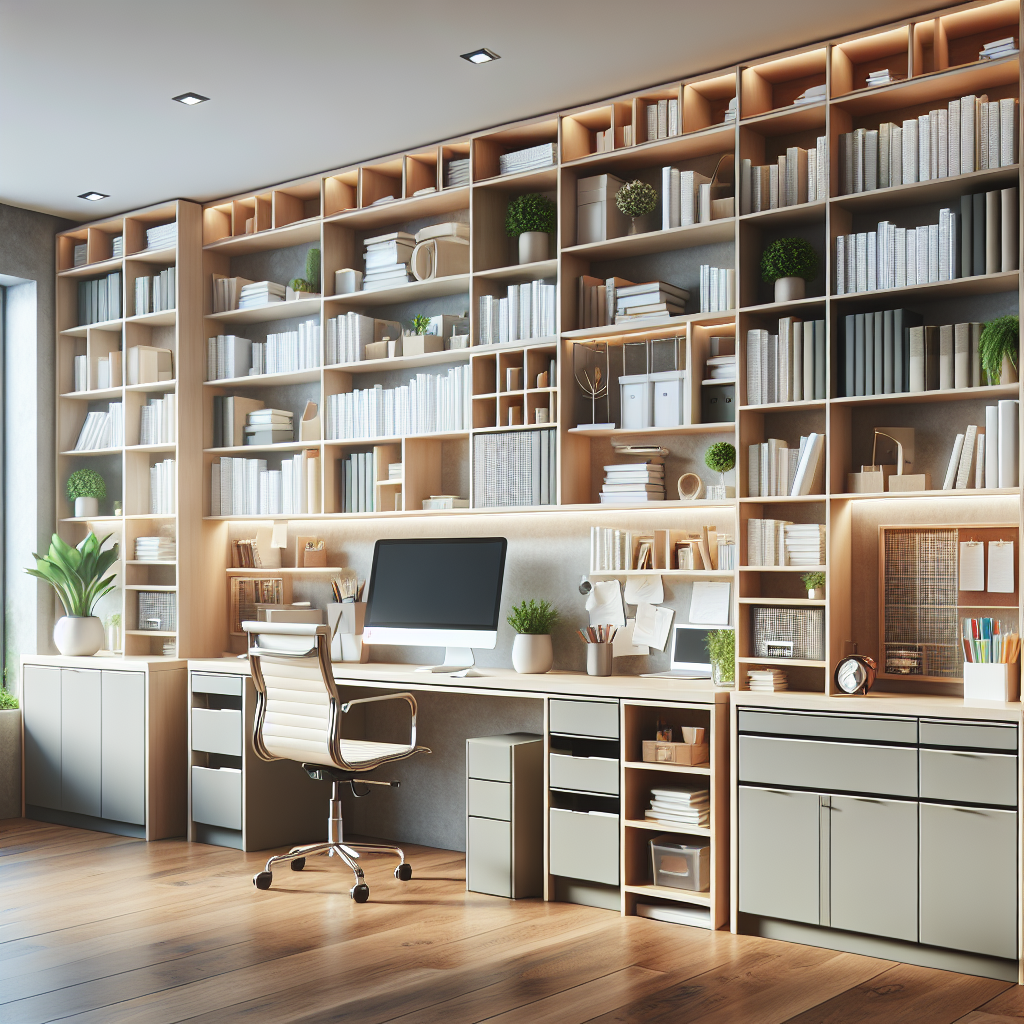
Step-by-Step Guide to Installing Built-In Shelving and Storage in Your Home Office
Welcome to your next DIY project: installing built-in shelving in your home office! Whether you’re a seasoned DIYer or a novice ready to take on a new challenge, this guide will walk you through each step of the process. By the end, you’ll have not only massively increased your storage space but also added a personal touch to your home workspace. Let’s dive in!
Step 1: Planning Your Design
First things first, let’s plan out your space. Measure the area where you want to install your built-in shelving. Consider how deep and high you want the shelves to be, keeping in mind the items you plan to store. Sketching a rough blueprint can help visualize the end result. Remember, thoughtful planning is key to efficiency, especially in compact spaces!
Step 2: Choosing the Right Materials
Selecting the right materials will affect both the appearance and durability of your shelves. For most home office setups, medium-density fiberboard (MDF) or plywood are popular choices due to their sturdiness and smooth finish. However, if you’re after a more rustic look, consider solid wood like oak or maple. Visit your local hardware store and don’t hesitate to ask for advice on what materials best suit your needs.
Step 3: Cutting Your Materials to Size
Once you have your materials, it’s time to cut them to the specified measurements from your design plan. If you’re not comfortable doing this yourself, most hardware stores offer cutting services. Ensure all pieces are cut precisely to avoid any uneven edges which could complicate the assembly.
Step 4: Assembling the Framework
With all your pieces cut to size, start assembling the frame. Secure the sides to the top and bottom pieces using wood glue and screws. For extra durability, consider adding corner braces. This framework will serve as the skeleton of your built-in shelving, so make sure everything is perfectly square and level.
Step 5: Mounting the Frame to the Wall
Now, you’ll need to attach the frame to your home office wall. It’s crucial to locate the studs in the wall to ensure your shelving will be securely mounted. Use a stud finder and mark the stud positions. Then, drill the frame into the studs using long screws. This step is vital for the overall stability of your shelving unit.
Step 6: Adding the Shelves
Insert the shelves at the desired heights by securing them to the frame with screws from the sides. If you anticipate storing heavy items, consider reinforcing the shelves with additional brackets underneath for added support.
Step 7: Finishing Touches
With the structure complete, it’s time for the finishing touches. Fill any screw holes with wood filler, sand down rough areas, and wipe down the entire unit to remove dust. Now, choose a finish that matches your home office décor—paint, stain, or varnish can all give your new shelving a professional look.
Step 8: Organizing Your New Shelves
Finally, the fun part—organizing your shelves! Use this opportunity to declutter and categorize your office supplies, books, and décor. Utilizing storage boxes and baskets can help keep things tidy and easily accessible.
Installing built-in shelving in your home office can seem daunting at first, but by breaking it down into manageable steps, you’ll find it’s quite a rewarding project. Not only does it add functional storage space, but it also personalizes your work area, making those work-from-home days a little more enjoyable. Plus, with the local hardware stores just around the corner ready to supply all your materials and offer expert advice, you’ve got all the support you need right in your community.
Top 5 Storage Solutions for Maximizing Space in Your Home Office
Whether you’re a bustling professional or a creative freelancer, your home office is not just a place to work—it’s where your ideas come to life. However, as projects accumulate, so does the clutter. Keeping your workspace organized and efficient is paramount, and what better way to achieve this than through innovative storage solutions? Here, we explore the top five storage solutions that not only maximize space but also enhance your productivity and keep your home office tidy.
1. Vertical Shelving Units
When floor space is at a premium, think upwards! Vertical shelving units are a godsend for small or crowded home offices. These towering units utilize the often-overlooked space above your desk or in corners, providing ample storage for books, files, and office supplies. Opt for adjustable shelves to customize spaces to fit items of varying sizes, from bulky binders to decorative items that spark joy and creativity.
2. Under-Desk Drawers and Cabinets
Don’t just focus on the walls—look under your desk, too! Under-desk drawers and cabinets are excellent for stowing away items you want to keep close but not necessarily on display. These hidden gems are perfect for storing stationery, important documents, and tech gadgets. By keeping these items out of sight but within reach, you maintain a clean aesthetic while ensuring practical accessibility.
3. Multi-Purpose Furniture
For those who love furniture that works as hard as they do, multi-purpose pieces are the way to go. Consider a desk with built-in bookcases, or a storage ottoman that doubles as guest seating. These versatile solutions not only save space but also reduce the amount of furniture cluttering your office. Plus, they offer a seamless look that can make your office appear larger and more organized.
4. Pegboards and Wall Organizers
Turn your wall into a functional work of art with pegboards and wall organizers. These are not just for tools in the garage; they’re equally effective in the home office. Customize your pegboard with hooks and bins to hold everything from pens and scissors to tape and notepads. They’re particularly great for creative professionals who need various small tools and materials within arm’s reach, neatly displayed and easy to find.
5. Hidden Storage Spots
Finally, get creative with hidden storage spots. Think floating shelves with underside hooks, discreet cabinets built into wall niches, or even a pull-out shelf in your existing cabinetry. These clever solutions keep your supplies neatly tucked away until needed, contributing to a minimalistic and organized workspace atmosphere.
Implementing these storage solutions in your home office can dramatically change how you feel and function in your workspace. By choosing the right combination of storage options, you not only maximize the space available but also create an environment conducive to productivity and creativity. Remember, a tidy office is a productive one!
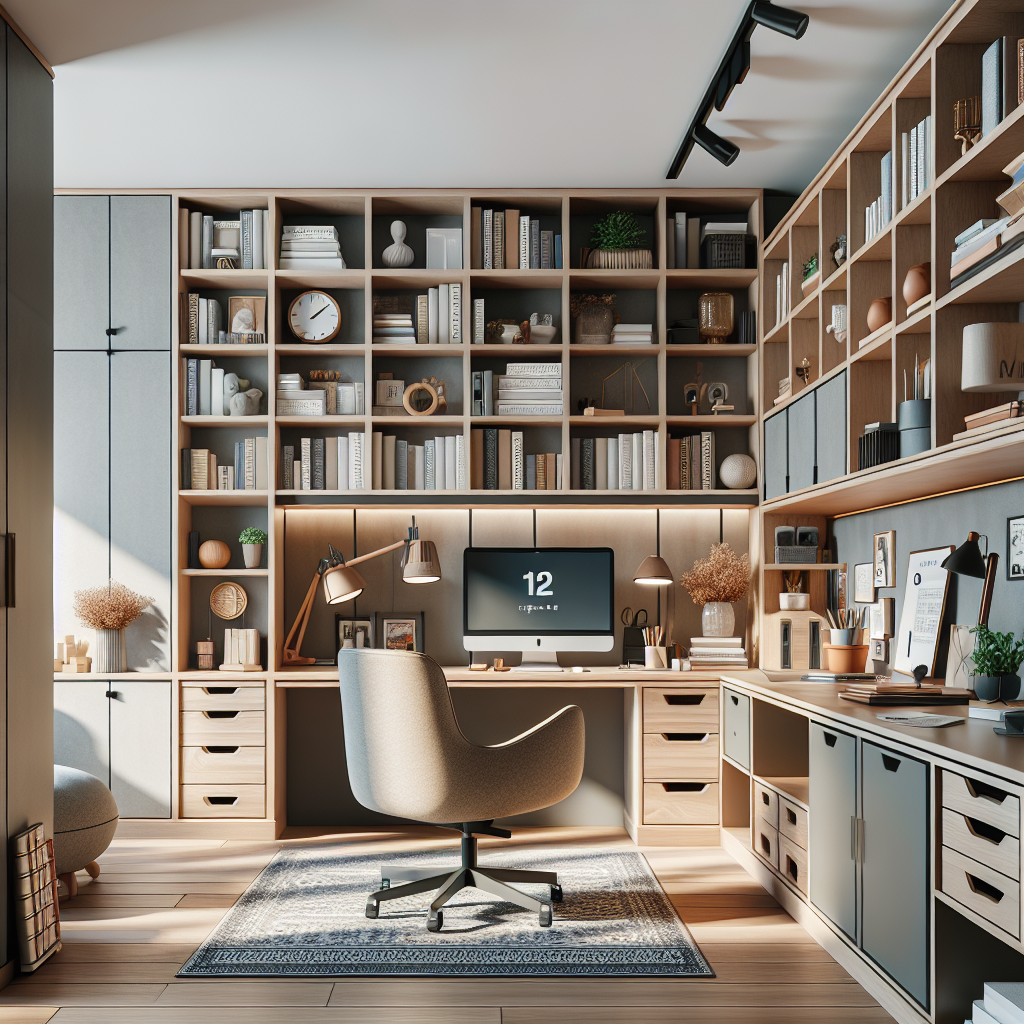
What are the Best Materials for Home Office Built-In Shelving?
Choosing the right materials for your built-in shelving is crucial to ensure durability and aesthetic appeal. Popular options include:
- Wood: Offers a classic look and can be customized with different finishes and stains.
- Metal: Provides a more modern appearance and is highly durable.
- Laminate: A cost-effective choice that comes in a variety of colors and patterns to match your office decor.
Consider the overall style of your home, the weight of items you plan to store, and your budget when selecting materials.
How Much Does It Cost to Install Built-In Shelving in a Home Office?
The cost of installing built-in shelving can vary widely depending on the materials used, the size of the installation, and labor costs. On average, homeowners might spend anywhere from $500 to $5,000. For a specific quote tailored to your project, connecting with a local contractor through BuildNet can give you a competitive and personalized estimate.
Can I DIY My Home Office Built-Ins or Should I Hire a Professional?
While DIY projects can be satisfying, built-in shelving involves complex measurements and installation that might require professional tools and expertise, especially if you want a seamless look. Hiring a professional ensures that the job is done right the first time and can actually save you money on materials and repairs in the long run. Check out BuildNet’s directory to find trusted local contractors who can help.
What Are the Latest Trends in Home Office Design with Built-In Shelving?
The latest trends focus on maximizing space and enhancing functionality, with a keen eye on aesthetics:
- Minimalist designs: Sleek, simple shelves with clean lines.
- Multi-functional spaces: Shelves that accommodate books, technology, and office supplies.
- Personal touches: Incorporating elements that reflect personal style or branding, using unique materials or custom configurations.
How Do I Optimize Storage Space on My Home Office Shelves?
To maximize the functionality of your shelving, consider these tips:
- Vertical storage solutions: Use the full height of your walls where possible.
- Adjustable shelving: Allows you to change the configuration as your storage needs evolve.
- Baskets and bins: Great for storing smaller items and keeping shelves looking tidy.
What Should I Consider Before Installing Built-In Shelving?
Before embarking on this project, consider the following:
- Purpose: Determine what items you’ll be storing—books, decor, electronics, etc.—to decide on the type of shelving that’s best.
- Location: Assess the space where you intend to install the shelving. Ensure there is sufficient wall space and no obstructions.
- Lighting: Think about installing integrated lighting solutions to make the shelves both functional and a focal point.
Summary
In designing your home office, built-in shelving can be a game-changer, not only for its functionality but also for its ability to enhance the aesthetics of your space. Whether you prefer a minimalist design or need a multifunctional area, carefully planning and executing the installation of built-in shelves will provide you with a tidy and efficient workspace.
If you’re considering adding built-in shelving to your home office, remember that while a DIY approach is possible, the expertise of a professional can ensure quality and durability. Don’t hesitate to leverage the resources available through BuildNet, where you can connect with skilled local contractors who can provide free quotes and bring your vision to life. Check out our website to get started on enhancing your home office today!

